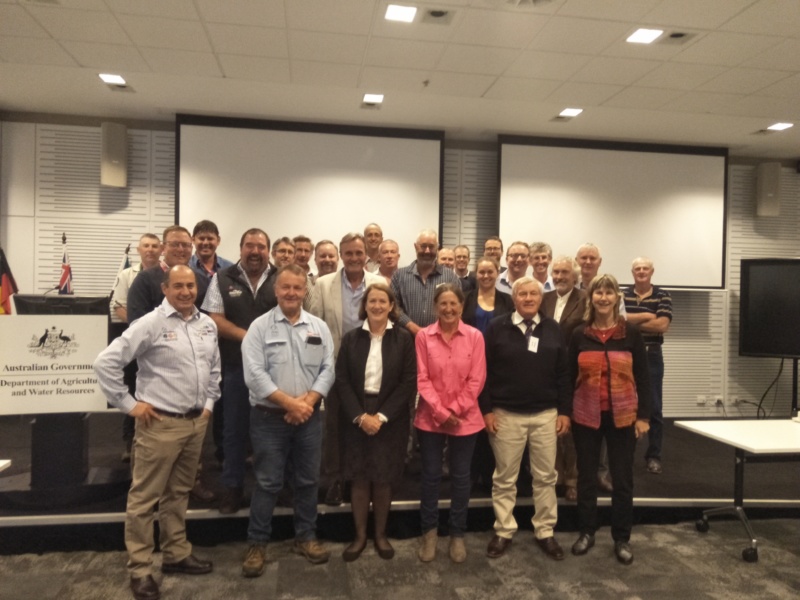6 June 2019
The National Wild Dog Action Plan Stakeholder Consultation Group (NWDAPSCG) and Coordination Committee (NWDAPCC) met in Canberra early May to review the Plan’s progress and achievements. Originally scheduled for February, the meeting date was pushed out to ensure the formal NWDAP Stage 3 Review process was properly in place.
Committee members bring a diversity of skills to the table such as research and extension, primary production, policymaking, natural resource management and communication. Australia’s peak livestock industry bodies and landholders are represented, and under their stewardship, NWDAP has continued to help shape and support best practice wild dog management in this third stage of the Plan.
The NWDAPCC is also the Steering Committee for the Centre for Invasive Species Solutions (CISS) National Wild Dog Coordinator project. Coordinator, Greg Mifsud, actively promotes best practice wild dog management around Australia and his detailed report was reviewed and endorsed by the Committee.
Stage 3 Review & Impact Assessment
The Coordination Committee has commissioned a final review and impact assessment of the NWDAP Stage 3 to determine whether the objectives of the Plan have been fully met. Feedback from the Review will also inform the development of a potentially continuing NWDAP beyond 2020.

In another demonstration of industry/government solidarity, the mandatory five-year review is being co-funded through industry and the federal Department of Agriculture and Water Resources (DAWR).
Contributing industry groups committed to ongoing wild dog management outcomes include Meat & Livestock Australia (MLA), Australian Wool Innovation (AWI), Sheep Producers Australia (SPA), Wool Producers Australia (WPA) and the Cattle Council of Australia (CCA).
Agtrans Research is undertaking the Review, having earlier conducted the impact assessments of the National Wild Dog Facilitator program in 2011 and the Invasive Animals CRC in 2015.
The rationale and procedures for the final review (including a cost-benefit analysis) were explained to the meeting. Stakeholder consultation and input was highlighted as a critical part of the review process.
The impact assessment process identifies and describes the economic, environmental and social impacts associated with the outcomes of the NWDAP investment.
According to Agtrans, the mid-term review (conducted by GHD Consultants) estimated the net annual economic benefit for Stage 1 and 2 of the NWDAP at between $4.2 million and $6.67 million and identified two key ‘first order’ benefits: increased leveraging of resources and improved efficiency of wild dog control efforts.
Media & Communications
Stage 3 communications have evolved to a half-time NWDAP Communications Coordinator backed up by the strategic input of the CISS Communications Manager.
The significant body of knowledge around NWDAP continues to be housed on the PestSmart website, which is about to undergo a significant update, leading to better communication to those at the ‘coal face’ of wild dog management.
An important part of the NWDAP review is assessing the effectiveness of our communications with stakeholders. Did we achieve the goal of increasing awareness, understanding and capacity building in the wild dog management? NWDAP Communications Coordinator Meredith Ashton presented a draft survey to the meeting and stakeholders were urged to complete the final version and distribute it to their networks.
A key to improving the reach of NWDAP communiques is growing our subscriber base. Stakeholders were asked to actively encourage staff and partner organisations to subscribe using the form in the navigation bar.
The electronic survey tool used during the meeting provided valuable, concise feedback on how NWDAP can better communicate with its stakeholders and this will help shape best practice going forward.
Significant achievements
The Australian Industries Skills Council (AISC) endorsement of the new Certificate III course in Rural and Environmental Pest Management is a significant NWDAP achievement. Course material is currently being developed and RTOs sought to deliver the course.
“Ultimately, we would like to see nationally-endorsed, pest animal controller (PAC) training lead to a recognised profession. Ensuring the availability of properly trained PACs together with ongoing professional development for wild dog coordinators are priorities” Greg said.
Share